The Network of East Asian Think-Tanks (NEAT) organized the 36th NEAT Country Coordinators’ meeting (36thNEAT CCM)virtually via Zoom in Vientiane, Lao PDR on Tuesday, 6 September 2022, 08:00 am -12:30 pm (GMT+7), under the chairmanship of the Institute of Foreign Affairs of Laos (NEAT-Laos).
His ExcellencyThongphane SAVANPHET ,Deputy Minister of Foreign Affairs of the Lao PDR attended and delivered a keynote speech at the inaugural session of the 36thNEAT CCM. The meeting was moderated by Amb. Mai SAYAVONGS, Former Ambassador of Lao PDR to USA, Director General of the Institute of Foreign Affairs. The meeting was attended by NEAT country coordinators together with their delegations, namely Brunei, Cambodia, China, Indonesia, Japan, Korea, Laos, Malaysia, Philippine, Singapore, Thailand, Vietnam and Myanmar.
The meeting recapped the outcomes of NEAT activities in 2022 including the six Working Groups (WG) under the following themes: “Digital Transformation as a New Driver for Socio-Economic Development” on 7 June 2022, WG on “Sustainable, Inclusive, and Resilient Socio-Economic Recovery and Growth in the midst of the Pandemic” on 9 June 2022, WG on “Deepening APT Third-Party Market” on 23 June 2022, WG on “Strategic Communication Lessons from the COVID-19 Pandemic: APT Experiences, Best Practices and Way forward” on 12 July 2022, WG on “Sustainable Development Goals and East Asian Cooperation” on 21 July 2022, and WG on “Toward Carbon Neutrality in East Asia” on 23 July 2022, hosted by NEAT-Vietnam, NEAT-Laos, NEAT-China, NEAT-Philippines, NEAT-Korea and NEAT-Japan respectively.
In addition, all NEAT Country Coordinators and their delegations thoroughly reviewed and adopted NEAT Memorandum No. 19, which is the major outcome of NEAT activities 2022. The NEAT Memorandum No.19 offers critical recomendations in various areas for the ASEAN Plus Three leaders’ consideration.

Source: Collated by the NEAT Philippines Secretariat
The NEAT Philippines, led by the Philippine Institute for Development Studies (PIDS) in partnership with the Foreign Service Institute (FSI) Philippines and the University of the Philippines-Asian Center (UP-Asian Center), conducted the Working Group (WG) Meeting on “Strategic Communication Lessons from the COVID-19 Pandemic: ASEAN Plus Three Countries (APT) Experiences, Best Practices, and Ways Forward” last 12 July 2022, 13:00-16:50H via Zoom. The event was attended by 21 experts and observers from 11 APT countries.
In his opening remarks, the NEAT Philippines Country Coordinator, Dr. Aniceto C. Orbeta, Jr., underscored the need to explore the different strategic communication initiatives of each APT country, as it is necessary for the improvement of crisis management and post-pandemic recovery.

Source: Taken by the NEAT Philippines Secretariat during the opening remarks of Dr. Orbeta
Hence, the experts across two (2) sessions highlighted the crucial role of strategic communication in crisis response, and the way strategies are communicated affects the responses of each stakeholder to policies. Further, one of the trends in the discussions is the need to strengthen crisis and surveillance systems to prepare for emergency situations. For example:
· Laos demonstrated that successes stem from past investments to strengthen surveillance systems and result in functional early warning systems.
· Vietnam emphasized that proactive prevention is needed as well as, a high-flexibility strategy in order to respond strategically during a crisis. Along with investments in functioning systems, greater stakeholder collaboration among the various actors is needed.
· Cambodia recommends investing in preparedness and response at the national and sub-national level through multi-sectoral collaboration among various sectors and communities, families, and individuals.
· Korea underscored the importance of APT cooperation as the biggest partner for supply chain, investments, human exchanges, and trade.
· Japan highlighted the role of experts in risk communication to ensure transparency and candidness of government to secure public understanding.
· The Philippines emphasized the need to ensure coherence of messages from the top administration and government departments, national and local governments as well as, the institutionalization of fact-checking and awareness, risk communication, and crisis communication. However, for systems and partnerships to be well received by the constituents, it is important to ensure that communication is sensitive to the values and cultures of people.
· China demonstrated that social support such as informational support can positively impact individuals and regulate their negative emotional status. Indonesia emphasized that a media campaign alone is not enough to engage the public in times of a crisis.
· Malaysia’s findings show that behaviors and attitudes towards COVID-19 practices are related to cultural norms.
· Lastly, Singapore showed that information can be disseminated properly through differentiated communication mediums and communication strategies that are culture- and value-sensitive.

Source: taken by the NEAT Philippines Secretariat during the presentation of Dr. Salamah of NEAT Indonesia
Lastly, the experts highlighted policy recommendations and ways forward leveraging the use of strategic communication in crisis response. The recommendations were classified into three parts: (1) strengthening collaboration between the government and its stakeholders through communication crisis response; (2) promotion of the utilization of regional networks and deeper cooperation among APT countries; and (3) transparent and effective communication systems.
The first session was moderated by Dr. Joefe Santarita of the UP-Asian Center, and the second session was moderated by Mr. Jovito Jose Katigbak of the FSI. The meeting was synthesized by Dr. Francis Mark Quimba of PIDS. For more information about the working group, you may email the NEAT Philippines Secretariat at This email address is being protected from spambots. You need JavaScript enabled to view it..
On 23 June 2022, NEAT China Working Group on Deepening APT Third-Party Market Cooperation was successfully held. The meeting was hosted by the Institute of Asian Studies (IAS) of China Foreign Affairs University, NEAT China. About 20 experts and scholars from ten ASEAN countries, China, Japan and South Korea have attended. Deputy Director of IAS, Dr. Cui Haining, delivered the opening speech, while Associate Professor Miao Ji moderated and Associate Professor Li Feng from the School of International Economics delivered a keynote speech.
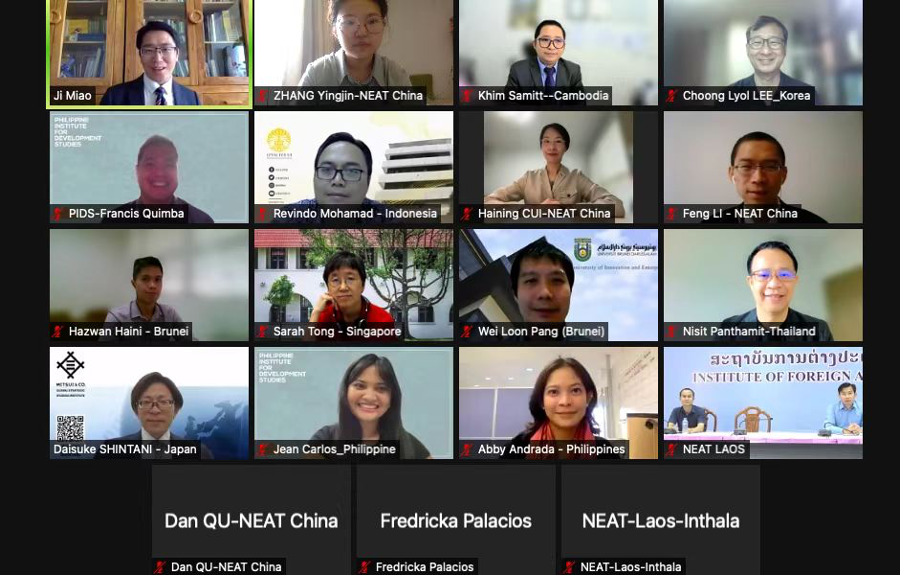
Source: NEAT China
The participants made excellent speeches and in-depth discussions on the topics of "institutionalization", "marketization" and "multi-objective optimization". According to the participants, the launch of the Regional Comprehensive Economic Partnership Agreement (RCEP) and the signing of the Memorandum of Understanding on Third Party Market Cooperation between China, Japan, China, South Korea and China-Singapore have laid a good foundation for third party market cooperation in East Asia. At present, cooperation in this area also faces difficulties and challenges at the institutional, financial and business environment levels in member countries. In this regard, participants reached a high level of consensus on the way forward: firstly, to continue to adhere to the principles of ASEAN centrality, open and inclusive cooperation and mutual benefits; secondly, to strengthen institutionalization and flagship projects in the areas of digital economy, infrastructure, energy and food security, green financing and human resource development; thirdly, to gradually establish a multi-faceted and multi-layered three-dimensional cooperation network model to promote the cooperation among government, enterprises and society to achieve a win-win situation.
Based on this meeting, China will draft the report of the Working Group and submit the final draft to the NEAT Annual Meeting and the 10+3 Leaders' Meeting this year on the basis of comments and suggestions from all parties.
The Network of East Asian Think-Tanks (NEAT) fruitfully organized its 35th NEAT Country Coordinators’ meeting (NEAT CCM) virtually via Zoom on 27th April 2022 under the chairmanship of the Institute of Foreign Affairs of Laos. In addition, NEAT successfully held six Working Groups (WG) namely WG on “Digital Transformation as a New Driver for Socio-Economic Development” on 7 June 2022,WG on “Sustainable, Inclusive, and Resilient Socio-Economic Recovery and Growth in the midst of the Pandemic” on 9 June 2022, WG on “Deepening APT Third-Party Market” on 23 June 2022, WG on “Strategic Communication Lessons from the COVID-19 Pandemic: APT Experiences, Best Practices and Way forward” on 12 July 2022, WG on “Sustainable Development Goals and East Asian Cooperation” on 21 July 2022, and WG on “Toward Carbon Neutrality in East Asia” on 23 July 2022. Significantly, the outcomes of NEAT were reflected in the CHAIRMAN’S STATEMENT OF THE 23RD APT FOREIGN MINISTERS’ MEETING, issued on the 4 August 2022 in Phnom Penh, Cambodia. The APT Foreign Ministers also look forward to welcoming the outcome of the 36th NEAT CCM and 19 Annual Conference.
On June 7, 2022, within the framework of the Network of East Asian Think-Tanks (NEAT), the Diplomatic Academy of Vietnam (DAV) held a virtual working group meeting themed “Digital transformation as a new driver for socio-economic development”. The meeting was attended by representatives from NEAT member countries and lecturers, researchers, and students from the DAV.
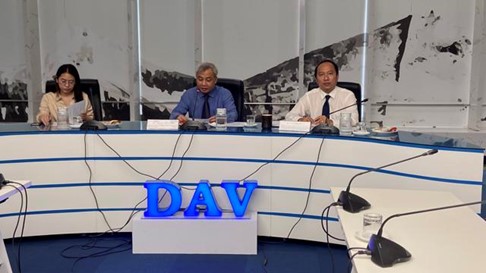
Assoc. Prof. Dr. Nguyen Anh Tuan speaking at the opening of the meeting
Speaking at the opening section, Assoc. Prof. Dr. Nguyen Anh Tuan, NEAT Vietnam Coordinator, Deputy Director-General of the Institute for Foreign Policy and Strategic Studies, DAV, said that the meeting was an opportunity for academics from NEAT member countries to exchange their knowledge, experiences, and views on digital transformation. It is worth noting the experiences of each country in digitalizing their economies and societies and promoting regional cooperation in the digital economy. He believed that the meeting would promote the cooperative relationship between the DAV and East Asian think tanks more effectively and sincerely.
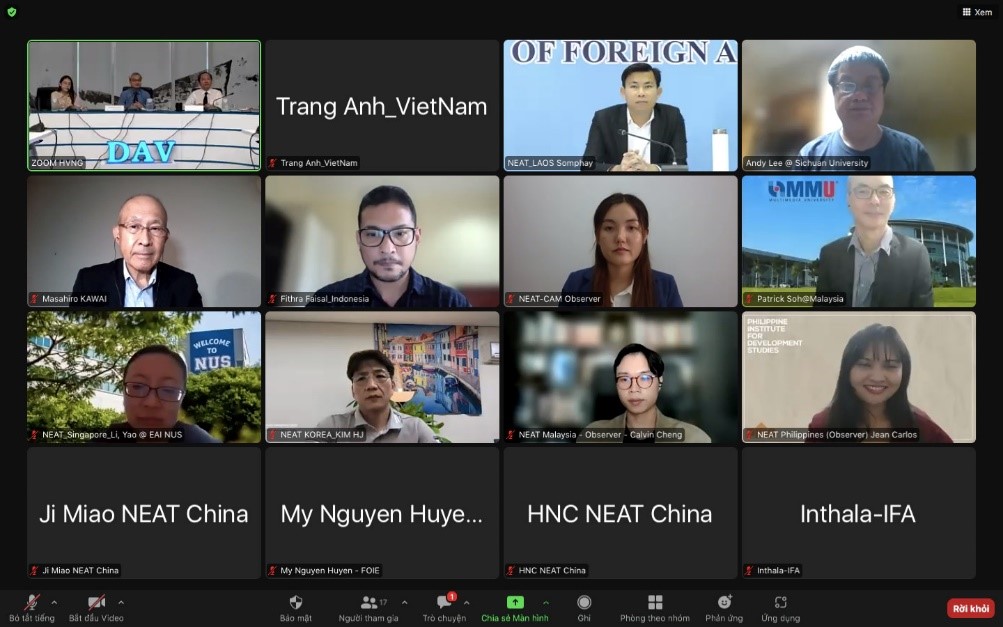
Speakers were attending the meeting.
During the meeting, experts representing NEAT member countries had a fruitful and candid discussion, focusing on each country's digital transformation strategies and policies. The speakers agreed digital transformation has played very important role to recover the economies of APT in post-covid-19 pandemic. However, it has faced many challenges, namely: 1. Inadequate ICT related legal framework; 2. Lack of digital infrastructure; 3. Limited digital literacy; 4. Digital gap between urban and rural areas; 5. Inadequate transport infrastructure and poor delivery system and so on.
The speakers also have recommended some solutions to successfully carry out the digital transformation such as: (i) to invest in disruptive R&D program; (ii) to create digital talents and appropriate IT infrastructure; (iii) to develop the startup ecosystem; (iv) to provide support and guidelines to encourage the private sector to adopt cutting-edge technologies; (v) to digitalize government services to create a strong and effective government; (vi) to enable firms (particularly SMEs) to participate in international trade (via cross border e-commerce) through international agreements; (vii) the promotion digital transformation and digitalization need to be accompanied by policy measures to protect those displaced by the digitalization process; (viii) to promote international cooperation indigital domainand discuss possibility of setting up a digital economy agreement among member APT countries./.
On 9th June 2022, the Institute of Foreign Affairs (IFA) of the Lao PDR, Chair of the Network of East Asia Think Tank (NEAT) 2022 organized its working group (WG)meeting under the theme “Sustainable, Inclusive and Resilient Socio-Economic Recovery and Growth in the Midst of Pandemic” virtually via Zoom Platform.
Amb. Mai Sayavongs, Director-Generalof the IFA of the Lao PDR attended and delivered the opening remarksat the inaugural session of the WG meeting. The WG meeting was divided into two sessions under the above overarching theme moderated by Mr. Sonexay Vannaxay, Deputy Director-General ofIFA, NEAT Laos Country Coordinatorand Mrs. KaymanyOraboune, Deputy Director-General of the IFA respectively.
The WG meeting was attended by NEAT country coordinators and experts from NEAT member countries namely NEAT-China, NEAT-Indonesia, NEAT-Japan, NEAT-Korea, NEAT-Laos, NEAT-Malaysia, NEAT-Philippine, NEAT-Singapore, NEAT-Thailand and NEAT-Vietnam. The participants openly and actively shared their views and national experienceson how to cope with the pandemic. More importantly, they provided various practical policy recommendations for accelerating the process of socio-economic recovery and boosting economic growth in a sustainable, inclusive and resilient manner in the midst of the pandemic outbreakin East Asian region and beyond.
At the closing session, Mr. Sonexay Vannaxay, Deputy Director-General of the IFA, NEAT Laos Country Coordinator, on behalf of NEAT-Laos expressed his sincere thanks to NEAT country coordinators, NEAT experts and all participants for their active contributions, which helped the WG meeting to be adjourned with the fruitful outcomes.
Inclusion of NEAT Efforts on the Chairman’s Statement of the 24th ASEAN Plus Three Summit
Source: ASEAN Secretariat (2021). Taken during the 24th APT Summit, 27 October 2021. https://asean.org/chairmans-statement-of-the-24th-apt-summit/
The contributions of the Network of East Asia Think Tanks (NEAT) were recognized during the 24th ASEAN Plus Three (APT) Summit held on October 27, 2021. The Summit was chaired by His Majesty Sultan Haji Hassanal Bolkiah, Sultan and Yang Di-Pertuan of Brunei Darussalam. To quote from the Chairman's statement:
"We also recognised the important contributions of the Network of East Asia Think-Tanks (NEAT) towards APT cooperation. We welcomed the outcomes of the 33rd NEAT Country Coordinators Meeting (NEAT-CCM) on 20 April 2021 and 34th NEAT-CCM on 1 September 2021, and the five NEAT working group meetings on various topics held this year, which advocated for regional preparedness and resilience in light of the COVID-19 pandemic, with a focus on helping MSMEs and working towards sustainable development in the region."
This recognition is one positive step towards NEAT’s goal of having its policy recommendations adopted by key policymakers.
NEAT, as a track two process of the APT, provides intellectual support for East Asian cooperation. NEAT reaffirms that the goal of community building in East Asia is promoting the welfare and well-being of the people and realize the East Asian Vision of Peace, Prosperity and Progress.
Amidst the pandemic, NEAT maintained its core activities which are convening of country CCMs and organizing working groups (WGs).
The 33rd and 34th NEAT CCM were held virtually last 20 April 2021 and 1 September 2021, respectively. NEAT Philippines hosted these meetings with the participation of twelve (12) Country Coordinators from APT countries and their delegation. In addition, five (5) WGs were organized on these topics: (1) Climate Change and East Asian Sustainable Development (18 June by NEAT China); (2) ASEAN Plus Three and COVID-19 Pandemic: Country Responses and Regional Cooperation (14 July by NEAT Indonesia); (3) Toward 20501 Carbon Neutrality in East Asia (17 August by NEAT Japan), (4) East Asia cooperation and Human Security in the Post-Covid 19 Era (23 July by NEAT Korea); and (5) ASEAN Plus Three Cooperation on MSMEs: Accelerating Digital Adoption to Thrive in the New Normal (21 July by NEAT Philippines).
NEAT 2021 activities were led by NEAT Philippines through the Philippine Institute for Development Studies in partnership with the Office of ASEAN Affairs of the Department of Foreign Affairs Philippines, University of the Philippines- Asian Center, and the Foreign Service Institute Philippines. For more information on NEAT 2021 and its events please visit its website https://neat.org.ph/. You may also access the Chairman’s Statement of the 24th ASEAN Plus Three Summit via this link https://asean.org/chairmans-statement-of-the-24th-apt-summit/.
The Network of East Asian Think-Tanks (NEAT) organized the 35th NEAT Country Coordinators’ meeting (NEAT CCM) virtually via Zoom in Vientiane, Lao PDR on 27th April 2022 under the chairmanship of the Institute of Foreign Affairs of Laos (NEAT-Laos).
His Excellency Thongphane SAVANPHET, Deputy Minister of Foreign Affairs of the Lao PDR attended and delivered a keynote speech at the inaugural session of the 35th NEAT CCM. Each session was moderated by Amb. Mai SAYAVONGS, Director General of the Institute of Foreign Affairs. The meeting was attended by NEAT country coordinators namely Brunei, Cambodia, China, Indonesia, Japan, Korea, Laos, Malaysia, Philippine, Singapore, Thailand, and Vietnam, (Myanmar did not attend the meeting) and scholars from 12 member institutes. The meeting recapped the outcomes of NEAT activities in 2021 while planning for 2022 activities. Six NEAT members including NEAT-China, NEAT-Japan, NEAT-Korea, NEAT-Laos, NEAT-Philippine and NEAT-Vietnam agreed to hold six working group meetings this year under the following themes: 1) Deepening APT Third-Party Market Cooperation, 2) Regional Cooperation to Achieve Carbon Neutrality in East Asia, 3) The sustainable, Inclusive and Resilient Socio-Economic Recovery and Growth in the Mist of the pandemic, 5) Strategic Communication Lessons from the Covid-19 Pandemic: ASEAN Plus Three Countries(APT) Experience, Best Practices and Way forward and 6) Digital Transformation as a New Driver for Socio-economic Development respectively during May to July 2022.
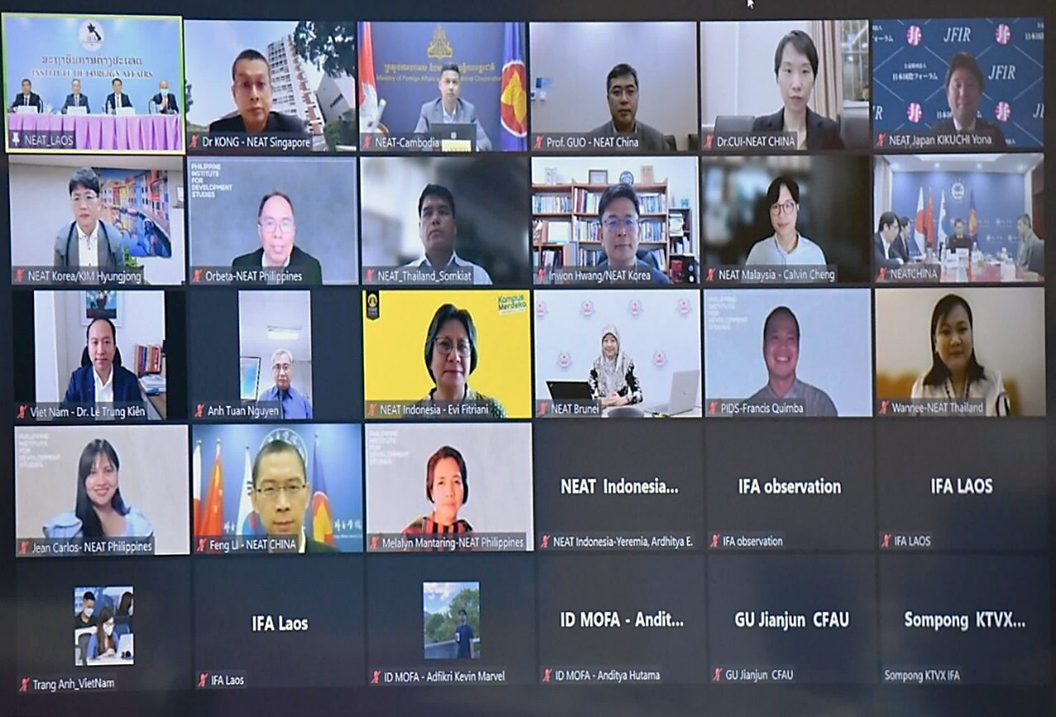
NEAT Philippines Hosted the 34th NEAT Country Coordinators Meeting
Source: NEAT Philippines Secretariat taken during the 34th CCM, 01 September 2021 via Cisco Webex. Photo arranged by Ms. Jean Carlos
The Philippine Institute for Development Studies, in partnership with the Department of Foreign Affairs-Office of ASEAN Affairs, University of the Philippines-Asian Center, Foreign Service Institute, and selected Philippine experts on regional integration, hosted the 34th Network of East Asian Think-Tanks (NEAT) Country Coordinators Meeting (CCM) on September 1, 2021, 13:00-17:00H (+8UTC) via Cisco Webex.
The meeting was attended by 45 representatives composed of NEAT Country Coordinators (NEAT-CC), Contact Persons, Working Group Representatives, Diplomats, and Members of the Academe from the ASEAN Plus Three (APT) Countries. Dr. Celia M. Reyes, former Philippines NEAT CC opened the meeting and introduced Dr. Aniceto Orbeta Jr. as the new Philippines’representative to the network.
Dr. Orbeta welcomed the participants by stating that ‘’as the new President of PIDS, one of my main thrusts is to continue the collaboration with policy research institutions like the Network of East Asian Think-Tanks. This is in support of the Institute’s vision to be the country’s foremost think tank and a globally recognized policy research organization by 2025. As a track two process of the ASEAN Plus Three, NEAT provides intellectual support for East Asian cooperation.’’
The two main agenda of this meeting was to discuss the results of the five (5) NEAT working groups (WGs), and draft a memorandum which will contain policy recommendations from the WGs to be submitted to the APT leaders who will meet in November 2021. Below are the details of the WGs:
|
Country |
Working Group Topic |
|
China |
Climate Change and East Asian Sustainable Development |
|
Indonesia |
ASEAN Plus Three and COVID-19 Pandemic: Countries’ Responses and Regional Cooperation |
|
Japan |
Toward Carbon Neutrality in East Asia |
|
|
East Asia cooperation and Human Security in the Post Covid-19 Era |
|
Philippines |
ASEAN Plus Three Cooperation on MSMEs: Accelerating Digital Adoption to Thrive in the New Normal |
The meeting was closed by Director Jim San Agustin of the Department of Foreign Affairs Philippines by acknowledging the importance of Track-2 efforts to the development of the region. He assured that the results of the NEAT 2021 will be mentioned during the APT Summit which will be held on November 2021.
NEAT is a network of government and research institutions in the 10 ASEAN countries plus Japan, South Korea, and China. It is a Track Two process for East Asian cooperation, the main purpose of which is to support, promote, and develop the ideas of East Asian cooperation and regionalism, and, in particular, to provide intellectual support for East Asian cooperation through studies of key and strategic issues concerning future developments of East Asian cooperation.
The meeting sought to strengthen the research collaboration among the APT think tanks to produce studies that will help the region recover from the effects of the COVID-19 pandemic. The results of the working group will be will be submitted to the APT track-one mechanism.
This is the second virtual CCM hosted by the Philippines this year. The Philippines hosted the 33rd CCM last April 2021.
The NEAT Laos is extending an invitation to the NEAT country coordinators, contact persons, and their delegations to attend the 35th NEAT Country Coordinators Meeting (35th NEAT CCM). Due to the COVID-19 pandemic still existing, the meeting is going to be held through videoconference (Zoom platform) on Wednesday, April 27, 2022, at 08:30-12:00 hrs. (GMT +7, Laos Time).
The CCM will be a good opportunity for NEAT members to liaise, review and exchange ideas about our NEAT activities in 2021 including the current and future activities in 2022. Hence, attendance and contribution at the said meeting would be highly appreciated.
Six (6) NEAT members will present their working group (WG) proposals, namely: NEAT China, NEAT Laos, NEAT Japan, NEAT Korea, NEAT Philippines, and NEAT Vietnam. The results of the WGs will be discussed on the 36th CCM in September 2022. The final output will be presented to Track-1 and APT Summit through a memorandum.








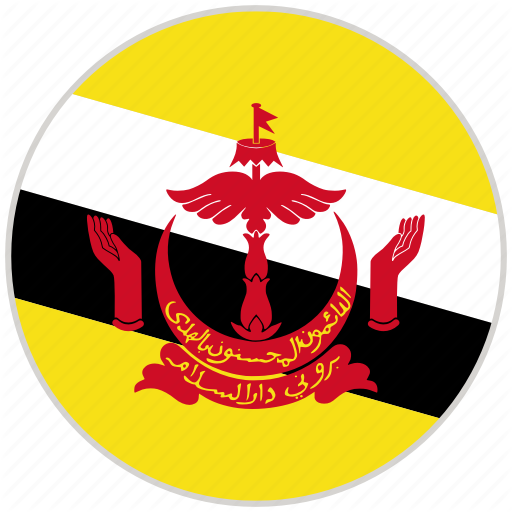
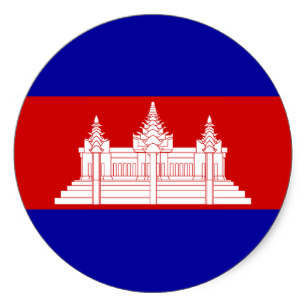

.png)



.png)




